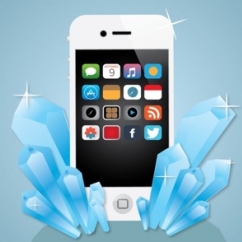Articles and News
Could Synthetic Sapphire Crystal Lead To Acceptance Of Synthetic Diamonds? September 24, 2014 (0 comments)

New York, NY—In a recent blog in the IDMA WINC newsletter, Ronnie Vanderlinden, secretary-general of the International Diamond Manufacturers Association, brought up an interesting point in the ongoing discussion about synthetic diamonds and their potential for disrupting the marketplace. He pointed out that synthetic sapphire already is widely used for applications such as watch crystals, and—very recently—some smartphone screens. The public cares less about what it is (synthetic) than what it does (provides a strong, scratch-free surface).
Could that kind of acceptance of a synthetic version of sapphire extend to synthetic diamonds? Synthetic diamonds already have tremendous industrial and biomedical applications—which nobody questions—and a growing contingent of consumers who readily accept them as gems in jewelry.
A recent article on BusinessInsider.com goes through the scientific process of creating synthetic sapphire for smartphone screens. But another article points out the “miracle material” may not necessarily be a huge improvement over glass: it doesn’t scratch as easily but it does crack more easily—and once it does, the crack will spread faster than glass. It also is more reflective than glass, which is good for a gemstone but bad for a tablet or smartphone you want to read in full daylight. It’s also more expensive than glass and not as easy to get consistent results in production (which also suggests that synthetic diamond screens probably won’t be coming to a smartphone near you any time soon, either.)
Contrary to pre-release rumors, Apple’s newly launched iPhone 6 does not have a sapphire screen, though it uses sapphire to cover the camera lens.
Still, if consumers are comfortable with synthetic gem materials for one use, how farfetched is it to assume that can lead to comfort with synthetic diamond jewelry? Either way, synthetic or natural, the most important thing—as regularly discussed by many experts and the topic of a panel at the Centurion Scottsdale show—is disclosure.
Top image: Mashable.com







